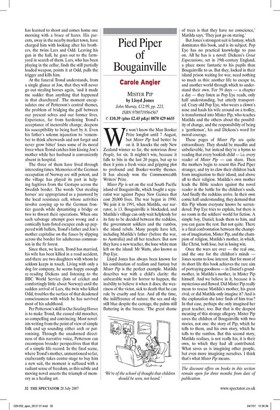Pied Piper of Bougainville
Carole Angier MISTER PIP by Lloyd Jones John Murray, £12.99, pp. 223, ISBN 9780719564567 £10.39 (plus £2.45 p&p) 0870 429 6655 We won't know the Man Booker Prize longlist until 7 August, but Mister Pip had better be on it. It knocks the only New Zealand winner so far, the notorious Bone People, for six. It mightn't win, because it falls to bits in the last 20 pages, but up to then it joins a fresh voice and gripping plot to profound and Booker-worthy themes. It has already won the Commonwealth Writers' Prize.
Mister Pip is set on the real South Pacific island of Bougainville, which fought a separatist war against Papua New Guinea that cost 20,000 lives. The war began in 1990. We join it in 1991, when Matilda, our narrator, is 13. Bougainville is blockaded, and Matilda's village can only wait helplessly for its fate to be decided between the redskins, the government soldiers and the rambos, the island rebels. Many people have left, including Matilda's father (before the war, to Australia) and all her teachers. But now they have a new teacher, the lone white man left on the island: Mr Watts, also known as Pop Eye.
Lloyd Jones has always been known for his combination of realism and fantasy but Mister Pip is the perfect example. Matilda describes war with a child's clarity: the unbearable wait for horror to happen, the inability to believe it when it does; the weariness of the victor, sick to death that he can rule by cruelty and fear. And all the time, the indifference of nature: the sea and sky still blue despite the carnage, the palms still fluttering in the breeze. 'The great shame of trees is that they have no conscience,' Matilda says. 'They just go on staring.'
But Jones's strongest suit is fantasy, which dominates this book, and is its subject. Pop Eye has no practical knowledge to pass on. All he has is a novel: Dickens's Great Expectations, set in 19th-century England, a place more fantastic to his pupils than Bougainville to us. But they, locked in their island prison waiting for war, need nothing so much as this: another life to escape to, and another world through which to understand their own. For 59 days — a chapter a day — they listen as Pop Eye reads, only half understanding, but utterly transported. Crazy old Pop Eye, who wears a clown's nose and hauls his wife around on a trolley, is transformed into Mister Pip, who teaches Matilda and the others about the possibility of change, and the responsibility of being a 'gentleman', his and Dickens's word for moral courage.
These pages of Mister Pip are quite extraordinary. They should be maudlin and unbelievable, but instead they're a hymn to reading that every bookish child — i.e. every reader of Mister Pip — can share. Then the mothers begin to resent this Pied Piper stranger, and try to claw their children back from imagination to their island, and above all to their religion. Matilda's own mother leads the Bible readers against the novel reader in the battle for the children's souls. And finally the redskins arrive. In their own comic half-understanding, they demand that this Pip whom everyone knows be surrendered. Pop Eye tries to explain, but there is no room in the soldiers' world for fiction. A simple boy, Daniel, leads them to him, and you can guess the rest. But not quite. There is a final confrontation between the champion of imagination, Mister Pip, and the champion of religion, Matilda's mother, in which, like Christ, both lose, but in losing win.
Once the wars are over — the real one, and the one for the children's minds — Jones seems to lose interest. But for most of its short life this book achieves the rare aim of portraying goodness — in Daniel's grandmother, in Matilda's mother, in Mister Pip himself. And we believe in it, because it is mysterious and flawed. Did Mister Pip really mean to rescue Matilda's mother, his great rival, or did Matilda only imagine it? And is the explanation she later finds of him true? In that case, perhaps she only imagined her great teacher, too. But that is the deepest meaning of this strange allegory. Mister Pip saves the children of Bougainville with two stories, not one: the story of Pip, which he tells to them, and his own story, which he tells to the rambos. But this second story, Matilda realises, is not really his; it is their own, to which they had all contributed. What saves us is imagining other people, but even more imagining ourselves. I think that's what Mister Pip means.








































 Previous page
Previous page